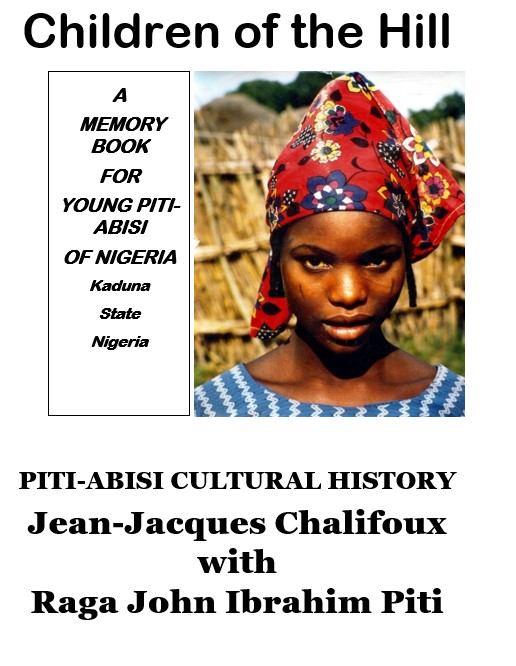
Book one : Piti-Abisi Cultural History
Abisi social organization and history: families, sections, marriages, economic, farming, and hunting, powers, and rituals.
Book two : Conversations on Abisi History
Short texts of more personal comments on various subjects read in books and articles that could be of interest to Abisi. They should be read after the chapters of Book One.
Piti Abisi Videos Page
Short videos of comments about Abisi
Book one
Chapter 1: Who am I? Why write about Piti Abisi ?
Chapter 2 Who and where are the Abisi?
Chapter 3 Abisi Sitting Friends
Chapter 4 Abisi Descent Groups
Chapter 5 Abisi Household and “Villages”
Chapter 6 Abisi Kirat : the House
Chapter 7 Women with Many Husbands: Making one out of many
Chapter 8 Abisi and The Zaria Emirate
Chapter 9 Abisi Tribute:Slaves,Women and Children
Chapter 10 Abisi and British Indirect Rule
Chapter 11 Abisi and Colonial Justice
Chapter 12 Abisi Conflicts:War, and Headhunting
Chapter 13 Paja: an Abisi Berdge Hero
Chapter 16 The Miango Piti Affray
Chapter 20 Abisi Cultural Economic
Chapter 21 Abisi Landownership
Chapter 22 Abisi Hoe Agriculture
Chapter 23 Abisi Crops, Soils, and Care
Chapter 24 Abisi Heritage Grains
Chapter 25 Abisi and Food Taboos
Chapter 27 Honey and Other Edibles
Chapter 30 Abisi Money and taxes
Chapter 35 Abisi women at Work
Chapter 36 Abisi Mikosira Begging for Rain
Chapter 37 Abisi Shouting for Rain and Cultural Identity
Chapter 38 Abisi Girl’s and Wife’s Marriages
Chapter 39 Abisi Bride Capture
Chapter 40 Abisi Work Marriage and Father’s Choice
Chapter 41 Abisi Love and Mother’s Choice House Marriages
Chapter 42 Abisi Widow and Grass Marriage
Chapter 43 Abisi Marriage System
Chapter 46 Abisi Bori Memories
Chapter 47 Abisi Gender relations in Bori And Uganiŋ
Chapter 48 Abisi Women Hunters in Bori Arena
Chapter 50 Abisi dodo Club House
Chapter 52 Abisi Dodo Youth Power
Chapter 53 Abisi Affliction and Dodo Cure
Chapter 54 Abisi Life Cycle from Birth to Funerals
Chapter 55 Abisi Kinship terms
Book 2 : New Conversations
Short texts of more personal comments on various subjects read in books and articles that could be of interest to Abisi. They should be read after the chapters of Book One.
Abisi Marriage by Capture
This conversation is about the Riner marriage ceremonial is very sophisticated, it has the form of forced marriage by abduction but no one is actually kidnapped, even if it looks like it on the surface. The meaning of such a custom has been one of the oldest in general history. How did the Abisi explained these customs ?
Ibarka: the Abisi horse
Ibarka is the Abisi-Piti word for horses incuding the Plateau Ponies. This text gathers informations about what I found about them and the scance ethographic notes I had. An important theme of the Piti -Abisi «horse culture» to be developped by oral historians.
I rode a hausa Horse
This experience helped me to understand how horse and clothing were symbols of power: on the horses and on the people.
Animalization
A german historian analyses how the Jihadists of Sokoto in pre-colonial West Africa (ca. 1800–1840) defined the Muslim ‘self’ and the alleged ‘pagan’ other. Was the «horse culture» an emblem of civilization in comparison of the wilderness of others.
Plantation Slavery North of Abisi
I have often asked this question, but the answers remained vague apart from the use of Abisi men to tend horses and women as servants or concubines, not much else was remembered. A book by the Nigerian Historian Salau may provide an an

More grace sir. U must be one of our ancestral fathers.
LikeLike
a very interesting work sir, pls sir how can one have the book?
LikeLike
wow! am very happy for this development, a very nice blog, this is what we been hoping to see, sir you are really a blessing to our people and our Land, even the state at all. Your reward is God blessing through out your generation. Permit me sir to share this across social media.
LikeLike
Please share
LikeLike
Hi
Howz it going?
I just wanted to reveal this Naija aggregated news blog– https://www.yohaig.ng/category/nigerian-entertainment/blogs/
If you love it, you can do any of the following:
Kindly place a link to it through your blog/website.
Share it via Facebook, Whatsapp, Twitter, Linkedin or Email.
Whichever way, keep up the fantastic work with your website.
Take care
Peter Anieke
LikeLike
Once again, I salute your effort in making us proud, without much of your write up we will be left nagging, but to God be the glory of Charley, the memories of your beautiful movements with Lulu is still lingering in my mind though I was 6-7 then, thanks once morr
LikeLike